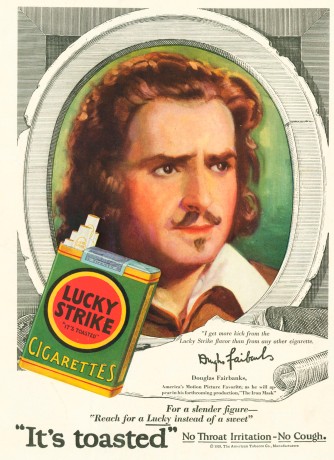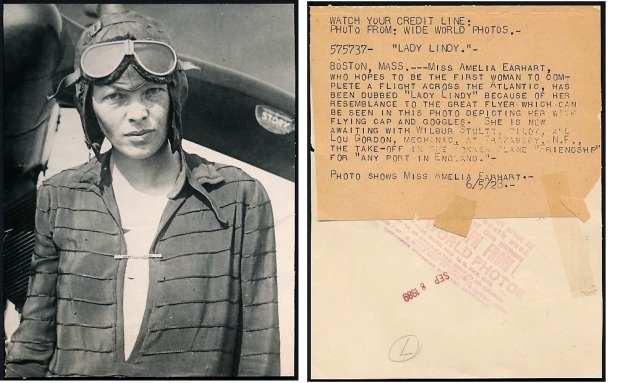Close your eyes and imagine that it’s 10 o’clock on a Saturday evening in London, Ontario. The year is 1928. This is our grandmother Doris Deverill’s world. She is 18, and is somewhere in the same city, perhaps, like you, sitting in a flocked, over-stuffed armchair with her feet curled beneath her.

In your room, the heavy drapes are drawn and a small lamp with a thin silk shade is colouring the room a dusky orange. You’ve just turned the knob on the front of the polished wooden radio set that has pride of place on the floor of your small living room, and it hums and then crackles to life. Strains of a theme song fill the space – This is My Lucky Day – and it’s not lost on you that the song has been chosen with a purpose; first, the word ‘lucky’ provides a little indirect advertising for the show’s sponsor, Lucky Strike Cigarettes, as well as a link to the show’s title, The Lucky Strike Radio Hour, and second, it’s a popular song, having been part of a string of Broadway revues called the George White Scandals, similar to the Ziegfeld Follies.
Immediately following the last notes of the song the voice of the unnamed announcer comes on, his speech clipped and crisp and slightly nasal. “And so begins this hour of dance music, presented for your pleasure by the manufacturers of Lucky Strike Cigarettes. The Lucky Strike Dance Orchestra will be heard in the tunes that made Broadway, Broadway.”
And on cue, the Lucky Strike Dance Orchestra’s bandleader, Benjamin Albert Rolfe, the so-called Boy Trumpet Wonder, introduces the first numbers of the evening, “a real dancing combination.” One of the songs – Bambalina – he calls an “old friend.”
You smile and listen as Rolfe and his orchestra play. His concept of dance music during this time of the late 1920s was that it should “throb and laugh with happiness; it should have the rhythm of a rubber ball, bouncing back, only to fall again, going on and on.” Those words were a fair description of what Rolfe himself had been doing for his entire career up to this point. Raised in Brasher Falls, New York, he’d played piccolo and cornet in his father’s band, performing throughout the eastern United States and Europe. After high school he picked up work as a musical clown in a traveling circus, then joined the Majestic Theatre Orchestra before finally heading the brass instruments department at the Utica Conservatory of Music. But show business was in his blood, and after a run as a bandleader and only marginal success as a vaudeville producer he eventually turned his efforts to movies, forming a production company and turning out more than 50 silent films.

Financial difficulties forced Rolfe out of that business and he took up his trumpet again and began performing as a solo artist. Eventually, inspired by the likes of Paul Whiteman and his “symphonic jazz”, Rolfe put together his own dance orchestra, and found a measure of success on the airwaves as master of ceremonies for the Lucky Strike Dance Hour.
The last strains of Bambalina fade, and Rolfe introduces another number, and after that, a waltz from the operetta The Merry Widow. The Merry Widow Waltz is already a “famous classic”, but in 1934 French actor and cabaret performer Maurice Chevalier will lend his charm to the film version of the operetta, and an Academy Award win for Best Art Direction will make the music just that much more popular. But for now, Rolfe’s Lucky Strike Dance Orchestra is doing justice to the notes, and you in your comfortable chair sway ever so slightly, dreaming up the feel of a hand at your back, leading you through the imaginary steps.
Then the music ends, and without a pause the never-named announcer brings listeners back to the real world, and makes the requisite pitch for the show’s sponsor. Tonight, the script-writers lead with Douglas Fairbanks, a founding member of the fledgling Academy of Motion Picture Arts and Sciences. But you have never heard of an Oscar. The first of those diminutive gold statues won’t be handed out by the Academy for another year, although when they are, it will be Fairbanks hosting the show and shaking hands with his peers when they take their bows. Despite his many and varied contributions to the world of film (he helped start the School of Cinematic Arts in California, and was one of the founders of the United Artists studio), Fairbanks would never win an Oscar himself.
The radio announcer reads his text: “Douglas Fairbanks, America’s motion picture favourite, will soon appear in his new production of ‘The Iron Mask.’ This is a sequel to ‘The Three Musketeers’ with Mr. Fairbanks again playing the part of D’Artagnan.
 The characters however are more romantic and adventurous and Mr. Fairbanks considers the picture as a whole to be faster moving than any story he has ever brought to the screen. The manufacturers of Lucky Strikes have requested me to read what Douglas Fairbanks has to say regarding the Lucky Strike Cigarette. Mr. Fairbanks says – ‘I get more kick from the Lucky Strike flavour than from any other cigarette. They are easier on my throat and wind. That’s why I smoke nothing but Luckies. Toasting really means a lot to me. My own experience has proven that toasting not only takes out the bad things but doubles the flavour.’”
The characters however are more romantic and adventurous and Mr. Fairbanks considers the picture as a whole to be faster moving than any story he has ever brought to the screen. The manufacturers of Lucky Strikes have requested me to read what Douglas Fairbanks has to say regarding the Lucky Strike Cigarette. Mr. Fairbanks says – ‘I get more kick from the Lucky Strike flavour than from any other cigarette. They are easier on my throat and wind. That’s why I smoke nothing but Luckies. Toasting really means a lot to me. My own experience has proven that toasting not only takes out the bad things but doubles the flavour.’”
You sigh and shift position. The hour grows late, and you want less talk and more music, and don’t care if Mr. Fairbanks smokes Luckies or Camels or even British Consols, which is unlikely, since they are a Canadian brand manufactured in Montreal, and Mr. Fairbanks, of course, is a Hollywood star.
Bandleader Rolfe announces the next couple of numbers, Crazy Rhythm, “a musical impediment of speech,” and Oh Evelyn, Stop Your Devilin, a song from the musical comedy Pom-Pom, and Mitzi’s favourite, according to Rolfe. He doesn’t share more details than that, but you know that Pom-Pom was released 12 years ago in 1916, and starred the “tiny prima donna from Hungary” Mitzi Hajos, whose name, the New York Times advised most helpfully, is pronounced “High-yuss.”

Despite the aids to pronunciation, the “golden haired darling” eventually became convinced that her Hungarian surname would never “roll readily from the American tongue,” and she legally dropped Hajos to become plain Mitzi. But as the Reading Times of Pennsylvania declared, “plain…she could never be, as witness her dressed as a boy in Pom-Pom.”
Two more songs follow, and then the announcer speaks again, this time sharing the endorsement of Lucky Strike cigarettes by yet another famous person, the aviation pioneer Amelia Earhart. The script goes like this: “A short time ago the world was thrilled by the daring Amelia Earhart, the first woman ever to cross the Atlantic Ocean by airplane. Of Lucky Strike cigarettes Miss Earhart said ‘Lucky Strikes were the cigarettes carried on the Friendship when she crossed the Atlantic. We bought a carton in Newfoundland before we took off, because Luckies are best. On a long hard grind of this kind they were real life-savers, and were smoked continuously from Trepassey to Wales. I think nothing else helped so much to lessen the strain for all of us.'” You think about that, and picture the intrepid Miss Earhart earnestly puffing her way through her share of the carton of Luckies, clad in her aviator coveralls, leather cap with earflaps snugged beneath her chin, and wearing clumsy gloves to protect against the cold of the 20 hour flight. Presumably pilot Wilmer Stultz and flight mechanic Louis Gordon had found time to inhale the other two-thirds of the smokes despite fighting bad weather they’d thought had blown them off course, and almost running out of gas. Amelia drew the world’s attention with that trip, although by her own words she was “just baggage” and wouldn’t pilot her solo voyage across the Atlantic until 1932.

Mr. Rolfe is back at the microphone, introducing five more numbers that float across the airwaves. You are yawning now, but the music is lively and keeps you in your chair, enjoying the beat of the “optimistic little melody, Old Man Sunshine,” and then the even spunkier Tiger Rag. But by the time the theme song plays to signal the end of the show, your eyelids are drooping and your hand props your chin. The announcer bids his listeners good night, and makes one last plug for the show’s sponsor. “This closes the program of one hour’s dance music presented for your pleasure by the manufacturers of Lucky Strike Cigarettes. The tunes that made Broadway, Broadway. Thank you.” But you do not hear those last sentences. You’re asleep, your breath coming evenly, your head tilted back on the cushion of that over-stuffed chair.
♦
Sources
Lucky Strike Radio Hour transcript
Thurlow O. Cannon, “B.A. Rolfe – From Brasher Falls to Broadway to Broadcasting,” in The Quarterly, St. Lawrence County Historical Association, January 1981.
Pom-Pom Coming to the Academy, Reading Times, 8 February 1917.
Douglas Fairbanks: The Extraordinary Life of Hollywood Founding Father, The Guardian online.

Aw, the pleasures to actually listening to the radio for relaxation. I remember doing that as a young person. The Saturday afternoon operas from New York, the plays on CBC, Guy Lombardo dance music on New Year’s Eve. Stuff like that has gone forever.
LikeLiked by 2 people
A different world, for sure. And in a lot of ways simpler. You lose some good things, but you also gain some good things.
LikeLiked by 1 person
Interesting how many stories through podcasts you can now listen to on the radio. What was old is new again! And what a feeling reading the first couple of paragraphs of Imagining The Radio Hour, because I just happened to be curled up to read the post in a room lit a dusky orange…..with Grandma’s lamp beside me. What a happy coincidence.
LikeLiked by 2 people
That’s lovely, Heidi! And true, too, about podcasts. Some of the most interesting things I read online are transcripts of podcasts. The stories are often longer than your typical article, with more depth and detail.
LikeLiked by 1 person